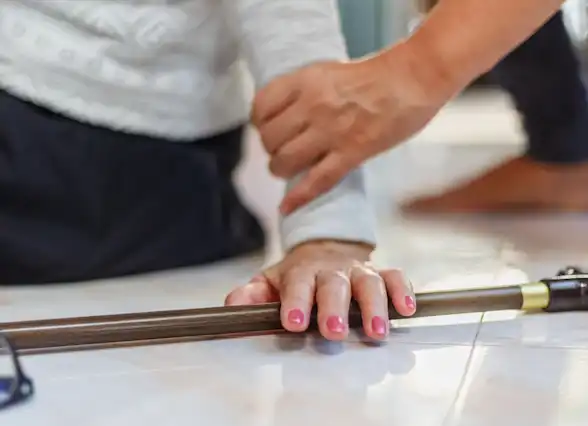Why Do People Fall?
There is no one-size-fits-all reason for why falls happen, though you should be aware of the most common contributors and address them.
Get insurance benefits, legal documents, and medical records in one place

Helpful Highlights
There are causes of falls that are internal (physiological).
There are causes of falls that are external (environmental).
There are causes that you may not even realize are related to falls.
Most falls occur at night in the bathroom or on the way to the bathroom.
As we age, we do assume additional risk factors that contribute to falling, however, falls are not a normal part of aging. You or your loved one can stay on your feet and avoid the risk of a fall.
Many things can cause a fall
Most falls are caused by a combination of factors, both internal (happening within you or your loved one) and external (happening in the environment). A fall rarely occurs due to just one cause or reason.
Internal causes (physiological)
Poor eyesight, especially in areas with low lighting
Poor hearing, which is usually accompanied by balance issues
Slower reflexes that happen as we age
Chronic conditions that can affect sensation and balance, such as diabetes, vascular diseases (heart disease, peripheral vascular disease), and foot problems
Cognitive impairment (mild cognitive impairment, dementia, Alzheimer's)
Depression
Age-related loss of muscle mass (sarcopenia) or generalized weakness
Vitamin D deficiency or osteoporosis
Drops in blood pressure from sitting to standing (postural hypotension)
Behavioral hazards, such as not modifying daily activities or routine exercises to account for new or increasing difficulties (examples are continuing heavy lifting or using a stepladder)
Incontinence is also not a normal part of aging
External causes (environmental)
Polypharmacy (taking 5 or more medications daily), especially certain medications
Joint replacement surgery, which usually increases risk only temporarily
Home safety hazards
Low lighting
Lack of support, such as walking aids or grab bars
Use of walking aids (yep, this is both a help and a hindrance!)
Slick or wet flooring
Loose rugs or frayed carpeting
Wires and cords
Cluttered walkways
The ambient temperature is too high
Ill-fitting or painful footwear
Pool and hot tub decks
Community safety hazards
Uneven ground
High curbs and steps
Lack of railing, fences, or benches
Multiple obstacles to navigate, especially in the city
Icy surfaces
Pool and hot tub decks
What can I do?
Check you or your loved one's home for trip and fall dangers and help make the home safer. Start by eliminating as many of the external risk factors and hazards as possible. Make sure to have good-fitting footwear with non-skid soles, remove obvious tripping hazards, repair damaged stairs and walkways, add lighting to stairs and walkways (simple nightlights can help), carpet over slick floors and make sure all other carpet is in good shape, remove excess rugs and ensure mats placed on tile or other hard surfaces (bathroom and kitchen) are non-skid or otherwise secured, place non-skid surfaces in bathtubs/showers and on pool or hot tub decks.
Consult an occupational therapist for home modification recommendations individualized to you or your loved one.
Take a walk to see how stable you or your loved one are and report your observations to a primary care provider. Also, watch for changes in strength or balance. Likewise, listen without assumption to any worries about feeling dizzy, weak, or unsteady, and get help.
Discuss the internal risk factors with a healthcare team, such as chronic conditions, medication side effects, and cognitive impairments, and have you or your loved one's feet checked. Ask a provider about a Vitamin D supplement.
Get regular vision and hearing exams. Also, stay physically active, especially in activities that strengthen leg muscles and improve balance. Consider nighttime urine containment methods such as bed pads, briefs, and bedside commodes. Most falls occur at night in the bathroom or on the way to the bathroom.
Note that a fall may be a warning sign
A fall might be an indicator of a new or worsening health condition. New, and often temporary, health conditions that can cause falls include:
constipation
infection — bladder, urinary tract, or respiratory
dehydration
sudden confusion (sometimes called delirium)
You or your loved one should always speak to a primary care provider if there's been a fall.
The CDC has an excellent Stay Independent brochure that includes a fall risk questionnaire.
RESOURCES
American Academy of Family Physicians
No content in this app, regardless of date, should ever be used as a substitute for direct medical advice from your doctor or other qualified clinician.
Get more support and guidance on insurance benefits, medical records and legal forms.
Helpful brings together your insurance benefits, legal documents, and medical records in one personalized place — so you always know what you have, and never have to search again.

Technology for Health Tasks. Mental Health for the Tough Stuff.
Helpful connects your medical records, insurance, and caregiving tasks automatically. And when you need more than logistics, a therapist is here to guide you.
In-Network and Covered
For Individuals, Couples and Families
HIPAA Compliant, Data Stays Private


Healthcare Tasks Simplified

From syncing records to spotting drug interactions, Helpful does the heavy lifting, turning complex health info into clear tasks and showing you benefits you can actually use, giving you clarity and control over your care.

In-Network Mental Health

Our licensed therapists are here to support you and your loved ones through stress, burnout, and life’s hardest moments, with an inclusive, compassionate approach that works with most insurance plans.

Create Legal Documents

Plan ahead by creating will, trusts, advance directives and more, that ensure your wishes are honored in the event you can’t speak for yourself -with Helpful guiding you every step of the way.